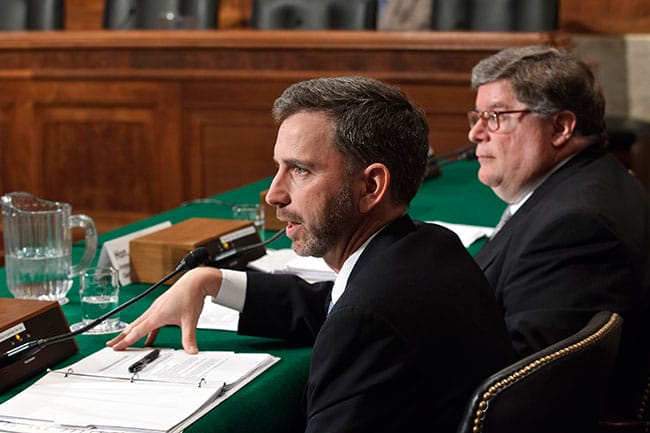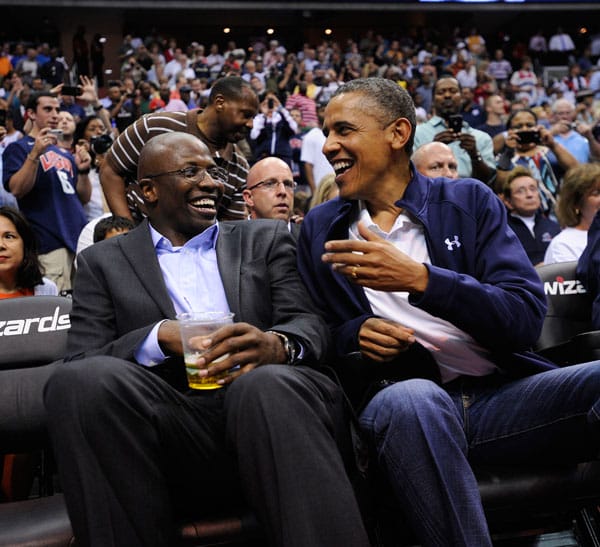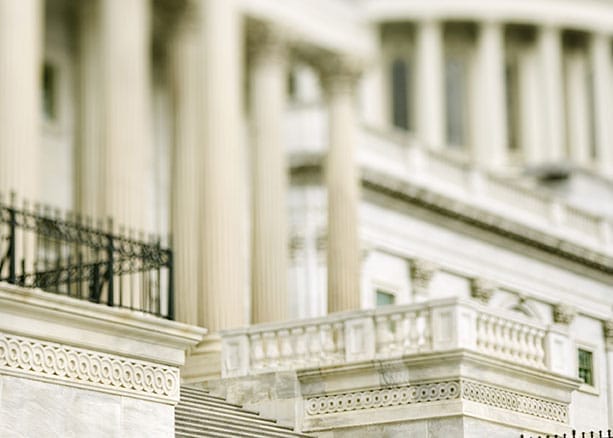During his family’s Caribbean vacation in late March 2012, Dan Tangherlini, WG’01, received a call on Friday night from a top White House colleague. A scathing report would soon be issued detailing how the General Services Administration (GSA) had spent $823,000 on a lavish Las Vegas staff retreat. The GSA administrator already had resigned. The Barack Obama White House sought to change the narrative before the story went public in three days. A crucial element of the administration’s response was naming Tangherlini, then the U.S. Treasury’s assistant secretary of management, as GSA’s acting administrator.
Tangherlini discussed it with his wife that evening and into Saturday. On Sunday, he accepted the offer. Now was his chance to run an agency at the heart of the federal government. Now was the time to put his management skills to work by reforming a massive bureaucracy, which oversees an annual business volume of $60 billion, a fleet of 205,000 vehicles and 400 million square feet of workspace.
The next Tuesday, his first day on the job, Tangherlini received a subpoena from the House Oversight Committee. Over the next two weeks, he testified four times before the unsympathetic panel.

The General Services Administration’s Dan Tangherlini, WG’01 (center), then acting administrator, testifies before the Senate committee investigating the misuse of taxpayer money on April 18, 2012.
“If you are going to testify four times before an oversight committee, do it in the first two weeks on the job,” Tangherlini says in hindsight, one afternoon in July 2014 while being interviewed by Wharton Magazine at a white marble conference table on the sixth floor of GSA headquarters at 18 and F streets, two blocks from the White House. “Saying, ‘I don’t know, I’ll get back to you,’ was actually a legitimate and credible answer. I literally didn’t know. And the record will reflect that we did get back.”
Tangherlini was appointed GSA administrator 16 months after that first phone call, the most recent stop on a public service career in the nation’s capital that has included a stint as deputy mayor and city administrator of Washington, D.C.; chief financial officer of the D.C. transit authority; and several positions in the federal Office of Management and Budget.
He continues about the GSA position: “The challenge of the job, early on, was to understand what was happening, bring accountability and figure out how to regain the trust of the American people, their representatives in Congress, our agency partners and the guy we work for—the president of the United States,” he says. “It was just a short to-do list.”
In Washington, Tangherlini is among a select few Wharton graduates working in the Obama administration’s second term. They are part of a growing network of Wharton alumni in the nation’s capital, which includes Matt Vogel, WG’08, chief of staff of the Office of the U.S. Trade Representative; Jonathan McBride, WG’97, who heads the White House Office of Presidential Personnel; and Sharon Kershbaum, C’92, WG’98, deputy assistant secretary at the Department of Treasury. Some like Tangherlini; Nate Jenkins, HUD White House liaison; and Michael Madon, WG’14, former deputy assistant secretary in the Department of the Treasury’s Office of Intelligence and Analysis, were already working in D.C. when they matriculated in the Wharton MBA for Executives (EMBA) Program. (Jenkins is a current EMBA student.)
All have served honorably, bringing to public service the quantitative rigor, drive for efficiency and hard work one would expect from Wharton alumni.
OBSERVING OBAMA
Reggie Love, WG’13, former special assistant to President Obama, also found Wharton while in the White House. A year into the EMBA program in 2012, he decided to leave government service and to devote himself full time to his Wharton studies, which upon graduation, brought him back to the nation’s capital as a partner and vice president for Transatlantic Holdings, a diversified financial holding company.

As a former White House aide, Reggie Love, WG’13, took in a basketball game with President Barack Obama on July 16, 2012.
Love’s Wharton experience capped a Washington journey that began in 2006, after the Duke University graduate spent two years bouncing around trying to find a home in the National Football League. His pro football career never matured, and he decided to explore possibilities in the public sector. That year, he landed an entry-level job answering constituent mail in the Capitol Hill office of the junior senator from Illinois, Barack Obama.
When Obama launched his presidential exploratory committee the following year, Love was tasked with traveling with the candidate on the campaign trail. He became Obama’s “body man,” the ubiquitous aide charged with such tasks as making sure the candidate ate three meals a day and had his remarks when it came time to deliver his stump speech.
Love continued in that role after Obama’s 2008 election, accompanying the president on travels to five continents and seeing up close what leadership looks like on the world stage.
[pullquote align=”right”]I figured if the president could do it, and he’s 20 years older than me, I should be able to do it too.[/pullquote]
“You go to business school, and everybody wants to figure out how to be successful in the world,” says Love. “The one thing you can’t teach, and the president was really good at, is building coalitions and getting people to do the small things to move an entire organization. He was able to communicate the vision and get people to buy into something bigger than themselves.”
According to Love, Obama accomplished this by making sure all sides of an issue were heard and providing enough transparency so those in the loop could understand why decisions were made. Obama’s determination to work as hard, or harder, than everyone else set an example that others followed.
“You’ve got to be willing to do anything you ask anyone else to do,” Love says. “Many times, it was seven days a week. You did what was required, be it overnight trips or flying to Asia. I figured if the president could do it, and he’s 20 years older than me, I should be able to do it too.”
Love takes these lessons with him as he travels the country, working now at a company that owns businesses that manage in excess of $12 billion in capital in the energy, telecom/logistics and financial sectors.
BUSTING WALLS
Strong leadership and a vision for change are key attributes for those who head the sprawling federal bureaucracies headquartered in Washington. In the wake of the GSA retreat scandal, then-acting administrator Tangherlini first had his staff conduct a top-to-bottom review of the department and its reason for being, which had been memorialized in a mission statement that was broad but lacking in specifics.
Under Tangherlini, this mission was refined to delivering “the best value in real estate, technology and acquisition” within the federal government, including its biggest customer, the Department of Defense.
[pullquote align=”right”]If you are going to testify four times before an oversight committee, do it in the first two weeks on the job.[/pullquote]
“We operate in a world when the agencies get to choose us; it’s G-to-G—government to government,” he says of GSA’s role as a massive service and equipment supplier. “It’s a choice they make, and we have to be thoughtful in delivering quality services, efficiently.”
Tangherlini also set the tone during renovations of the historic U.S. Department Interior building, constructed in 1915, which has been the GSA’s headquarters for decades. It’s one of the classic Washington federal buildings, with a limestone façade and a soaring entrance foyer with marble walls and floors. Tangherlini brought the walls down, literally, and his team eliminated scores of individual offices—including his own. The administrator’s long-time office—paneled in dark walnut with a large fireplace—was emptied and made into a meeting space. About 80 percent of the work stations in the building now are unassigned, with workers registering for their desks and toting along their laptops with IP phone connections. Tangherlini sits out in the bullpen in a room with 49 others. The space that once held 1,000 people now serves 2,000 GSA employees, and the remodel allowed the agency to consolidate workers from leased offices in D.C. and save taxpayers millions of dollars a year.
“We literally, as well as figuratively, pulled down the barriers of the organizational chart, to foster communication and improve the efficiency of how we work,” Tangherlini says. “By having everyone share a common space, we demonstrate our view that we are all in it together. It creates opportunities for interaction. We bump into each other. And I don’t have three people out front, keeping people from seeing me.”
EFFECTING EFFICIENCY
Serving as a political appointee at the highest levels of government, which Tangherlini has done, affords the opportunity to have significant impact on the public realm. These positions also lack job security; if the official who appointed you loses an election, your job can vanish. But there’s the flipside: Candidates win, too, and opportunities appear.
When Tangherlini joined the Obama administration’s Treasury Department in 2009, he recruited colleagues from the District of Columbia government. They included Kershbaum, who at the time was deputy chief procurement officer and had previously worked in his office to set up the District’s CapStat accountability program.
Kershbaum had turned to public service in 1998 after spending four years in the for-profit and nonprofit private sector. She began as a senior business analyst in Fannie Mae’s single-family mortgage arm, then spent four years in Philadelphia City Hall’s budget department before returning to D.C. as chief of staff of Fannie Mae’s community lending division. Next, she joined the D.C. government, serving under Tangherlini in the city administrator’s office. That’s when federal government beckoned.
After a few years working under Tangherlini at the Department of Treasury as a civil servant, Kershbaum was then approached for a new role that was a White House appointment within the agency. The interview was to be conducted with the head of the Presidential Personnel Office, McBride.
“I saw the person’s name, but it didn’t occur to me that I knew him,” recalls Kershbaum. “I walked in, and it was the Jon McBride I knew from Wharton. The selection experience was completely daunting, so seeing a familiar face was fantastic.”
At Treasury, Kershbaum helps oversee an agency with a $14 billion budget and nearly 100,000 employees that includes the IRS, the U.S. Mint and the Office of Economic Policy. She’s often among the upper-level managers who attend Treasury Secretary Jack Lew’s 9:30 a.m. daily meeting for updates on international financial affairs, domestic policy, legislative affairs, the latest economic data and the agency’s internal operation.
The budget sequester in 2013 demanded Kershbaum’s budgeting skills; her agency faced an across-the-board 5 percent reduction in funding. Some agencies furloughed employees or used other one-time fixes to make their cuts. Treasury used the cuts as an opportunity to restructure and spend at a lower level. Positions weren’t filled, two bureaus were merged, subscriptions and other non-critical contracts were cut, and leased office space was reduced by 1 million square feet.
It’s the kind of challenge that keeps her committed to public service.
“We found smarter ways to operate,” she says. “Our mission wasn’t affected, and we were paying far less.”
SERVING BOTH SECTORS
Madon came to the government through the U.S. Army, where he enlisted in 1999. He first served in the 82nd Airborne Division as an artilleryman, was later commissioned as a tank platoon leader in the 1st Calvary Division and then transitioned to military intelligence where he served as a commander of a technical intelligence company. He received the Bronze Star in support of operations Enduring Freedom and Iraqi Freedom and continues to serve as an intelligence officer supporting the Joint Chiefs of Staff in the U.S. Army Reserves.
At Treasury, he worked in the Office of Intelligence and Analysis, first as acting unit chief for the Europe and Middle East Office. In 2007, he became director of the Iraq Issues Office. In 2008, he ascended to the role of deputy assistant secretary, overseeing a multimillion-dollar budget and charged with strengthening the department’s relationships with its intelligence community and private-sector partners. He also supported departmental responses to significant cybersecurity threats to the financial sector. Such relationships were important in the effort to cut off funding to the Iraqi insurgents fighting the coalition, as well as for alerting Treasury and national security officials about the funding of other international threats—be it the threat of nuclear proliferation in North Korea or Iran, Russian organized crime or the drug cartels in Mexico. That work also extended to the private sector, which has growing concerns about cyberattacks on the financial world’s infrastructure.
“We helped set up the framework to facilitate that discussion,” he says. “Before 9/11, we had stovepipes of excellence throughout the intelligence community. I was fortunate to have joined the wave of intelligence professionals who saw it their duty to destroy those stovepipes and create robust information-sharing platforms within the community.”
This past spring, Madon left the Treasury Department to join RedOwl Analytics, a Baltimore-based, early-stage company using software to change the way companies conduct responsible oversight of their own people. He now works from a Washington, D.C.-based incubator called 1776, just a few blocks from the White House, where he’ll parlay his experience in the public sector with the analytic and marketing skills he learned at Wharton to help expand responsible employee oversight to the government space.
“Cyberattacks don’t just come from the outside,” he explains. “While organization insiders account for more than 60 percent of data breaches, most managers at large and midsize organizations say that detecting and preventing insider attacks is harder today than it was in 2011.”
He points to the actions of Edward Snowden as a prime example, which he believes undermined national security.
“The leaks in many ways put those great information-sharing platforms on life support, and I don’t believe we as a nation should have to go back to a pre-9/11 world,” he says.
One can still hear the passion for public service in Madon’s voice even as he’s hard at work at RedOwl, and of course the same can be said for those Wharton alumni currently serving in the federal government.
[well]
Hiring All the President’s Men and Women
We were fortunate to grab a few minutes on the phone with Jonathan McBride, WG’97. A former Goldman Sachs banker, media entrepreneur and chief strategy officer, McBride has worked with the Obama administration since 2009 and now devotes his 24/7 to being assistant to the president and director of the Presidential Personnel Office. What follows is an interview excerpt.
WHARTON MAGAZINE: When you first started in the administration, you described it as “exhilarating.” Do you still feel the same way?
JONATHAN MCBRIDE: I was speaking to a former colleague … about how, just the other day, the president was talking about two projects that she personally had started … and the exhilaration of that, and also the fear that’s associated with it, because every once in a while, you are reminded of the responsibility involved and the scale of things.
WM: What part of your job are you most passionate about?
MCBRIDE: We actually fully and thoroughly believe that strategic changes and policies start with the right people.
WM: Why public service?
MCBRIDE: As long as I can remember, my house was the house where we were licking stamps for some candidate. My parents were always activists, and there are many ways to be an activist, but politics is a key one.
WM: Would you recommend it to other Wharton MBAs?
MCBRIDE: If your motivation in life is to see some significant change, especially at scale, I would challenge anyone with an MBA: Why wouldn’t they be in public service?
WM: What thought have you put into your post-2016 plans?
MCBRIDE: I’ve tried to put a little thought into that, and not a lot. I have definitely decided for myself that my next job is not starting something from scratch. I also decided that I don’t necessarily need to be the boss, though I like to be “the boss.” I am going to stay in the talent space … in human capital.
[/well]
Connect with us: The University has a passion for work in D.C. Learn more about the Penn Wharton Public Policy Initiative at http://whr.tn/PPI.

























